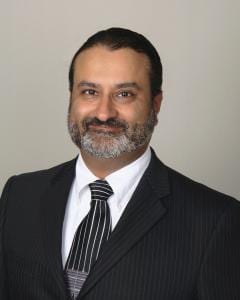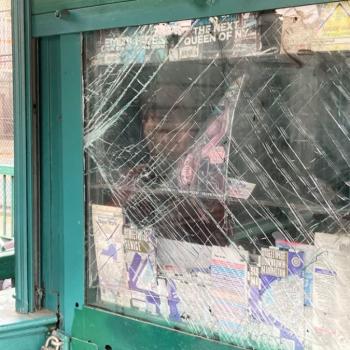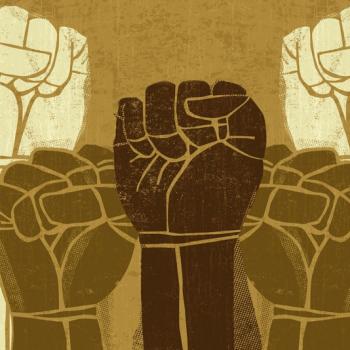In his recent book Resisting Throwaway Culture, bioethicist and moral theologian Charles Camosy expressed his concern about our culture’s increasing disconnectedness from “the physical, the embodied, the real, and especially from authentic encounters with ‘the other.’” This ethos has heavily shaped our nation’s political outlook. “Far from being motivated by a positive vision of the good, the body politic in the United States is motivated by fear and hatred of people (tribes) assumed to be bad or dangerous…In the 1990’s a median Democrat and a median Republican were not that far apart, but the politics of defining-by-opposition has pushed those medians further and further apart.”
Camosy laments the fact that Christians so readily toss out the rich insights of their faith in the name of tribal allegiance. “Christian liberals and Christian conservatives often hold views indistinguishable from those of secular liberals and conservatives…Authentic attempts to live out the insights and values of scripture and tradition not only provide the chance to lead a more coherent and less idolatrous life (with the God of Jesus Christ and his Body, the Church, as the ultimate concern-not a liberal or conservative tribe’s ideology), but they also provide a helpful critique of our secular political culture’s incoherency.”
I wasn’t surprised when Camosy announced last February that he was withdrawing his support from the Democratic Party, opting instead to join the American Solidarity Party, “a small but growing group that refuses to compromise on support for women, protection for prenatal children and solidarity for working people and the poor and vulnerable.”
I had first heard of the ASP back in the summer before the 2016 election. Its platform sounded idealistic, yet refreshing. Four years later, it’s become a resounding beacon of hope. It’s been slowly garnering more mainstream attention, most recently being mentioned in a New York Times article on “Weird Christianity.”
I interviewed Amar Patel, the chairman of the ASP to find out more about its platform and vision.

SA: Can you tell us the history behind the ASP and what your role is?
AP: The party was founded in 2011 as the Christian Democratic Party USA with a desire to bring the traditional concepts of personalism, subsidiarity, solidarity, and sphere sovereignty into the public sphere. After 2012, the party changed its name to the American Solidarity Party and slowly developed online as a discussion group until officially incorporated in 2016 in Pennsylvania. The party ran the Mike Maturen/Juan Munoz ticket in the 2016 Presidential election gathering a little over 6000 votes. Since then we have gone through a couple of platform and bylaws revisions and a change to a delegate based national convention. As the Chair of the National Committee it is my job to conduct regular meetings and coordinate activity across the party.
SA: What’s the foundational vision of the ASP?
AP: I maintain that we have firmly planted a flag at the intersection of three solid philosophical ideals: the political organizing principles of Christian Democracy (personalism, solidarity, subsidiarity, and sphere sovereignty), a Consistent Life Ethic (human dignity is tantamount from conception to natural death), and distributism (seeking widespread private ownership of the means of production). The philosophies are generally harmonious and would have widespread appeal if not for the tribalism that keeps people bonded to the duopoly despite the cognitive dissonance that their coalitions create.
SA: Can you explain what distributism might look like in an American context?
AP: Purely single person or family owned businesses already exist, which is the ideal, but the days where an acre and a plow suffice are gone. Worker co-ops would be the next level up. Those already exist around the United States. Employee owned corporations where the workers have voting rights regarding management exist to a certain extent as well. I think promoting distributism in an American context requires an analysis of how the influence of money (banking, bureaucracy, government) creates barriers for more widespread ownership.
Corporate apologists will often claim that the government creates undue burdens, but a distributist should clearly point out the fallacy there. Corporations thrive because of the red tape government creates. That is because the larger a company the more lawyers, accountants, and management level people they can staff to navigate the mounds of compliance that exists for businesses. If we wanted more entrepreneurs, we would reduce or remove government regulation the more equitable a business was to its employees both in compensation and decision making. As an example, OSHA exists to protect the safety of workers when management decides working conditions, but if the workers decide their own conditions and see the profit of their own labor would they need this oversight?
The concept of “too big to fail” should be anathema to a proponent of free markets. If the community has to bail out big business is the market really free? To contrast the corporate approach to appeasing non-employee stock holders before all other considerations let us look at the Mondragon collective in Spain. Made up of 260 individual co-ops, the collective employs 75,000 people in 35 countries. After the real estate bubble burst in 2008 many publicly traded companies laid off workers to maintain the bottom line. Mondragon did not lay off anyone even though some of their cooperatives went bankrupt. Worker-owners were transferred to other parts of the collective and all employees took pay cuts to make sure commerce continued. Could that happen in our system?
The final distributist critique of our current system is that economic rent through usury, corporate subsidies, patent leverage, land speculation, etc. means that many people make a lot of money with no effort. Looking around you see a lot of people working 40+ hour weeks that make very little money and/or receive few benefits. An efficient market would allow everyone to flourish or flounder together. We must diminish the inefficiencies in our system to restore justice. Policy like decreasing income tax on labor and transferring it to ground rent would balance inefficiency. Removing corporate subsidies like toll free roads would make smaller businesses with shorter supply chains more effective. Changing our intellectual property system from patents to compulsory licensing models would decrease inefficiencies between research and production. These are just some examples.
SA: Who tends to be attracted to the ASP, and what kinds of people are currently involved in it?
AP: In my opinion I see people who are first and foremost pro-life for the whole life. There is no compromise on that point. Next, our membership recognizes that the US economic model does not work for the poor and vulnerable. Finally we have people that resist the notion of “the most important election ever” mindset that has become pervasive. When you can see past the tribalism, you recognize that the names change but the stale ideas don’t. People are not isolated individuals made for a cold market or nameless parts of a nanny state. ASP members want a government that respects families as the basic units of society and prioritize their flourishing.
SA: I know many others who are disillusioned with the two party system, but obviously third party candidates have had a hard time breaking through the Democratic-Republican “duopoly.” What do you say to people who say a vote for a third party is a wasted vote? And what is the ultimate goal of the ASP knowing realistically that US politics are dominated by the two party system?
AP: The fact that we talk about battle ground states every four years should tell everyone that a duopoly vote is a wasted vote pretty much everywhere except in those states. For example, voting for the ASP in IL, CA, NY, and TX will be a lot more worthwhile than voting Trump or Biden. The numbers are very clear. One candidate or the other will win by millions of votes and you will be a meaningless statistic on either side of the gap, but an ASP vote will clearly be counted as a protest vote and be acknowledged in its own right. On the flip side, a third party vote in a contested state is even more powerful because the stinging loss of an election by losing a demographic that you were stringing along would cause duopoly candidates to reconsider their tactics. Anyone should be able to see the libertarian market language stolen by Republicans or the statist socialist language stolen by Democrats.
Astute observers of the two parties should recognize that they are not cohesive bodies but coalitions of subgroups that are not naturally allied. What do hedonist financiers have to do with traditional Christians? What do labor unions have to do with the abortion industry? Only tribalism holds the duopoly parties together. We believe our platform has a cohesion that doesn’t appear to disjoint factions but allows people to support a cause without the cognitive dissonance found elsewhere.
SA: In my opinion, the defining-by-opposition logic seems to be most abstracted from reality when talking about immigration. Trump’s inflammatory rhetoric toward Central America migrants pushes the left further toward an unqualified “open border” stance. Neither “side” takes into account the actual needs and experiences of the people implicated. What’s the ASP’s take on the “reality” of immigration in the US?
AP: I think the biggest fear with immigration is the theft of resources, but data does not support this. Since illegal immigrants spend most of their income immediately, an estimated 8 million jobs depend on their consumption. Even conservative institutions estimate that low-skilled laborers show a modest (less than 5%) decrease in wages due to illegal immigration. Far more astounding numbers are wealth-to-population ratios that should shock people to stark reality. The top 1% of US wealth holders have $5 trillion in cash equivalent. That’s so much money they can’t spend it or invest it. Let’s say 14 million illegal immigrants were stealing all the wealth of 14 million Americans. $5 trillion divided by 14 million is $350,000 a person. What is the greater injustice? 14 million people trying to live, raise families, build a future barely taking anything away from their neighbors, or a wealth class that holds dead money?
SA: In a recent interview, journalist Chris Arnade critiques the tendency of those in the “front row” educated elites to discount the value of staying rooted in one’s local community. “It’s hard to measure the importance of staying in a community all your life, the network of connections you have, the fact that you wake up every morning and you look out and you see the same lake…or you know the people around the lake. That’s hard to put a price tag on…” The upward mobility of those in the front row derives from an atomized, autonomous narrative of fulfillment, which often has negative consequences for those in the “back row.” But without a sense of belonging or rootedness, even “successful,” well-educated people can easily fall into despair and loneliness. I know the ASP values strengthening small business and local communities. What can you say about these values and the struggles that so many young people are facing today?
AP: I have learned far too late in my tenure in the ASP that even in a party that values human relationships we have over relied on impersonal means for our activity. Facebook and Twitter are effective marketing tools, but they are terrible for personal interaction. Roots are formed in families, neighborhoods, and churches. The last generation became unchurched and now its children are missing something they never had. As COVID stay-at-home orders have been put into place, my neighbors and I have started gathering on the street corner to conduct distanced socializing. Several of the younger couples have remarked how great it is to meet people on their block after a couple of years of being here. I remember my youth where I knew every single family on our street. There has to be an intentionality to bring that back.
SA: How can we get started building a society rooted in a more integral vision of the human person? What can everyday people do “on the ground,” and what is already being done? Can you point to any specific examples?
AP: My next phase will be working in the co-operative business sphere and looking at the Strong Towns movement. The American Solidarity Party has created a space for office seekers to find lofty ideals, now we need to take those ideals and put them into action. Meet your neighbors. Engage in deeper conversation about sustainability in the neighborhood. Increase that outlook to your town. Stay consistent. The ASP platform can be good soil, but for grass roots to grow they must be watered and cultivated with constant attention. We need to be visionaries not dreamers. That means doing what it takes to make a vision into reality.













